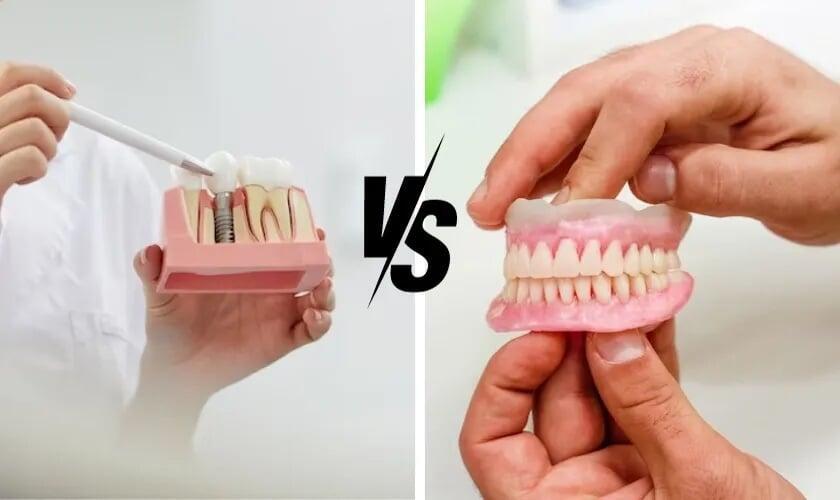Tooth loss can affect more than just your smile—it can impact your confidence, speech, ability to eat, and even your overall health. Fortunately, modern dentistry offers two reliable solutions: dentures and dental implants. While both restore missing teeth, they differ significantly in design, comfort, cost, and long-term benefits. So how do you choose the one that's right for you?
In this blog, we’ll break down the pros and cons of dentures vs. implants and help you make an informed decision based on your needs, goals, and lifestyle.
What Are Dentures?
Dentures are removable appliances used to replace missing teeth and surrounding tissues. They come in two main types:
- Complete (Full) Dentures: Replace all teeth in the upper or lower jaw.
- Partial Dentures: Replace a few missing teeth and are anchored to the remaining natural teeth.
Modern dentures are designed to look natural and restore basic function. They’re custom-made to fit your mouth and are held in place by suction, clasps, or adhesives.
What Are Dental Implants?

Dental implants are a more permanent solution. A small titanium post is surgically placed into the jawbone, mimicking a natural tooth root. Once it heals and integrates with the bone (a process called osseointegration), a crown or bridge is attached to restore function and appearance.
Implants can replace a single tooth, multiple teeth (via an implant-supported bridge), or a full set of teeth (with implant-supported dentures like All-on-4).
Dentures vs. Implants: Side-by-Side Comparison
Feature | Dentures | Implants |
Stability | May slip or shift; adhesives may be needed | Fixed in place; no movement |
Appearance | Look natural, but may appear bulky | Mimic natural teeth closely |
Comfort | May cause gum irritation | Feel more like natural teeth |
Function | Good for basic chewing and speaking | Superior chewing power and speech clarity |
Bone Preservation | No; bone loss continues over time | Yes; stimulates and preserves jawbone |
Longevity | 5–10 years (may need relines or replacement) | 15–25 years or more with proper care |
Maintenance | Daily removal and cleaning required | Brushed like natural teeth |
Surgery Required | No | Yes (minor oral surgery) |
Cost | More affordable upfront | Higher initial cost but long-term value |
Suitability | Ideal for those with extensive tooth loss or limited bone structure | Best for healthy individuals with sufficient jawbone |
Factors to Consider When Choosing
1. Your Budget
Dentures typically cost less initially. However, they may require frequent adjustments, relining, and replacements over time. Implants are more expensive upfront, but they tend to last much longer and require less maintenance.
Tip: Think of implants as a long-term investment, while dentures are a more immediate, cost-conscious solution.
2. Bone Health and Jaw Condition
Dental implants require a healthy jawbone to anchor securely. If you’ve had missing teeth for a long time, bone loss may make implant placement more complex or require a bone graft. Dentures, on the other hand, do not require strong jaw support.
Tip: A dental CT scan or panoramic X-ray can help determine your bone quality.
3. Age and Health Status
Younger patients often prefer implants due to their durability and long-term benefits. However, for seniors or those with medical conditions that make surgery risky, dentures may be a safer, simpler choice.
4. Lifestyle and Comfort
Implants offer unmatched comfort, stability, and convenience. They don’t move or require removal at night. Dentures may take time to get used to and may need adhesives or periodic adjustments.
Tip: If you lead an active lifestyle or want minimal fuss, implants may be the better fit.
5. Timeframe
Implants take longer to complete. The healing process after placement can take several months before the final crown or bridge is attached. Dentures, especially immediate ones, can be made relatively quickly after tooth extraction.
The Best of Both Worlds: Implant-Supported Dentures
For those who want the stability of implants but need to replace a full arch of teeth, implant-supported dentures offer a hybrid solution. These dentures are anchored to 2–6 implants, improving stability and chewing power without the cost of replacing every tooth with an individual implant.
What Do Dentists Recommend?
Many dental professionals consider implants the gold standard for tooth replacement due to their durability, function, and ability to preserve the jawbone. However, they understand that every patient is different.
A thorough consultation with your dentist will include:
- X-rays or scans to assess bone condition
- Review of your medical history and lifestyle
- Cost and maintenance discussion
If you’re looking for a permanent, natural-feeling solution and are medically fit, dental implants may be the right choice. If you prefer a quicker, less invasive, and more affordable option, dentures can still offer a great improvement in function and appearance.
Don’t decide alone. Speak with an experienced dentist or prosthodontist who can guide you through your options and recommend a solution tailored to your unique needs.














